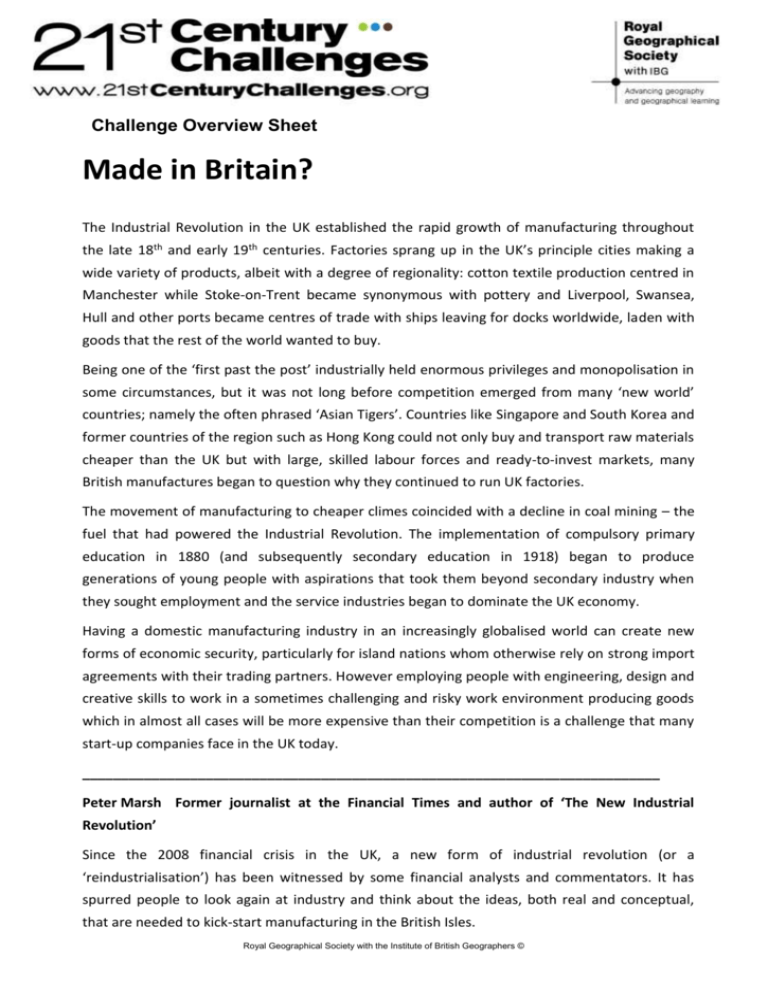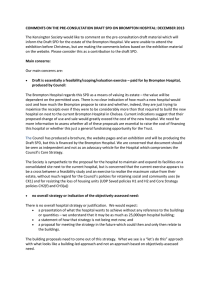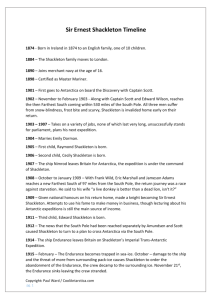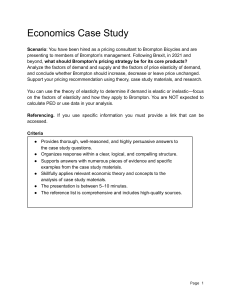msword - Royal Geographical Society
advertisement

Challenge Overview Sheet Made in Britain? The Industrial Revolution in the UK established the rapid growth of manufacturing throughout the late 18th and early 19th centuries. Factories sprang up in the UK’s principle cities making a wide variety of products, albeit with a degree of regionality: cotton textile production centred in Manchester while Stoke-on-Trent became synonymous with pottery and Liverpool, Swansea, Hull and other ports became centres of trade with ships leaving for docks worldwide, laden with goods that the rest of the world wanted to buy. Being one of the ‘first past the post’ industrially held enormous privileges and monopolisation in some circumstances, but it was not long before competition emerged from many ‘new world’ countries; namely the often phrased ‘Asian Tigers’. Countries like Singapore and South Korea and former countries of the region such as Hong Kong could not only buy and transport raw materials cheaper than the UK but with large, skilled labour forces and ready-to-invest markets, many British manufactures began to question why they continued to run UK factories. The movement of manufacturing to cheaper climes coincided with a decline in coal mining – the fuel that had powered the Industrial Revolution. The implementation of compulsory primary education in 1880 (and subsequently secondary education in 1918) began to produce generations of young people with aspirations that took them beyond secondary industry when they sought employment and the service industries began to dominate the UK economy. Having a domestic manufacturing industry in an increasingly globalised world can create new forms of economic security, particularly for island nations whom otherwise rely on strong import agreements with their trading partners. However employing people with engineering, design and creative skills to work in a sometimes challenging and risky work environment producing goods which in almost all cases will be more expensive than their competition is a challenge that many start-up companies face in the UK today. ___________________________________________________________________________ Peter Marsh Former journalist at the Financial Times and author of ‘The New Industrial Revolution’ Since the 2008 financial crisis in the UK, a new form of industrial revolution (or a ‘reindustrialisation’) has been witnessed by some financial analysts and commentators. It has spurred people to look again at industry and think about the ideas, both real and conceptual, that are needed to kick-start manufacturing in the British Isles. Royal Geographical Society with the Institute of British Geographers © Industry is actually a relatively simple process made up of four main components: materials, skills, energy and capital. Yet the huge variation possible within each of these components has led to a situation where over ten billion unique products are made a year globally and economically, the sector makes up a sixth of the world’s economy. Worldwide, manufacturing employs 300 million people and shows no sign of lessening in importance. The UK presents quite a different picture. As the number of people employed in manufacturing has decreased over time, the volume of the UK’s manufactured goods has risen in direct proportion. The British Isles holds one percent of the global population, yet produces two percent of the world’s manufactured goods. As the tenth largest manufacturer by value in the world, the picture of UK manufacturing is one that is far from dead. Unlike China however, who lead the table of top manufacturers, the UK manufacturing base is one centred on the long term investment in a few select and small things rather than the bigger projects that would re-establish UK secondary industry more firmly. ___________________________________________________________________________ Will Butler-Adams OBE (Managing Director of Brompton Bicycle Ltd) Brompton Bicycle is a UK manufacturer of folding bicycles. Founded in the UK in 1975 by Andrew Ritchie, the company has grown to become the largest manufacturer of bicycles in the UK. The company has bucked many trends, remaining solvent and now employing 230 employees, while Raleigh bicycles moved overseas and the UK car industry closed down around it. Taiwan is now the top bicycle maker in the world by volume and is able to produce them far cheaper than Brompton. Brompton Bicycle has been able to stay successful despite this due to a number of factors. Firstly, and most centrally, is Brompton’s sense of innovation. For its products to sell for profit, against strongly priced competition, Brompton realised the need for modernism in every stage of the manufacturing process: in design, on the factory floor and in their marketing. High overheads and high labour costs mean that UK manufacturers have to come up with efficient, simple and clever solutions to the same hurdles that all businesses face. This ‘best practice’ has to be shared and used across UK industries in order for them to stay ahead. The locational factor really can count for something in UK manufacturing. Having high levels of protection for their intellectual property is important for Brompton Bicycle. There is little chance of import substitution undercutting the business in London (as has been seen in China and in the Royal Geographical Society with the Institute of British Geographers © early Asian tigers) because no one else is making anything close to their product in the UK, let alone the city. Another factor that Brompton Bicycle feels is important is a sense of ‘honesty’ surrounding British products. Spin and somewhat underhand marketing means that some consumers do not always believe they are getting value for money when they buy from companies overseas. The providence of the product for some produces an ethical value that goes beyond economies and creates an integrity that is unique to a British-made product. ___________________________________________________________________________ Dr Eddie Kirkby (Charity Operations Manager at The Manufacturing Institute) The Manufacturing Institute is a UK based charity that aims to inspire, educate and improve people in such a way that new forms of manufacturing find their way into the UK. One way they aim to do this is through Fabrication Laboratories or ‘Fab Labs’. Fab Labs are 3D printing laboratories that are set up in a way that make them accessible to ordinary people. They are designed to bridge the gap between creative ideas and engineering as well as quickening the whole manufacturing process. The first Fab Lab was started in Boston, USA in 2002 by Professor Neil Gershenfeld. Thirteen years later there were more than four hundred globally in fifty different countries. The first to open in the UK was in Manchester in 2010 and there are now fourteen spread all over the country. Fab Labs hold a number of key principles and benefits at their core. Empowerment and inspiration of individuals is highly important. Virtually anything can be made by a 3D printer, and with relatively few skills, opening out the manufacturing process to new sets of people, including those of a younger age who may not have ever considered a career in engineering or manufacturing. Fab Labs utilise ‘just-in-time learning’. This is the concept that those who come to the laboratory only initially learn the precise skills needed to get their ideas for their own product made, reducing the length of the whole process considerably. The Manufacturing Institute and Fab Labs question whether this form of ‘whole device engineering’ could be more widely employed across the sector as a whole. Fab Labs champion new ways of working, such as more explorative, collaborative and inclusive practices as well as celebrating ‘play’ in engineering and ‘failure’ as part of the development Royal Geographical Society with the Institute of British Geographers © process. In this way they believe the skills shortage, which has been cited as the primary barrier to a more successful UK manufacturing industry base, will be met. ___________________________________________________________________________ Simon Middleton (Founder of ‘The Shackleton’ brand which encompasses craft based goods) The thought of engineering does not have to surmise the highly technological world of the digital age. While manufacturing invariably involves factory lines and technical forms of production, craft and goods designed through artisanal means remain present in the secondary sector. The Shackleton brand encompasses just such craft. Initially a UK company producing banjos, it traded off the true story of Antarctic explorer Ernest Shackleton famously choosing to save the instrument from the shipwrecked Endeavour. It began as a small time hobby and soon looked to expand into a viable business. The central message from banks was that the business was not a worthy investment and so the Shackleton brand turned towards crowdfunding; the practice where a large number of small scale investors raise the necessary funds for a project (usually via websites and social media). An analysis of the crowdfunding investors showed that they actually has little interest in banjos – it was the story of Shackleton and the polar expedition that really inspired them to invest. With this in mind, the Shackleton brand has taken its four central principles: authenticity, distinctiveness, compulsion and excellence to explore other craft ideas that fit within them. Knitwear and real ale followed, all made in the UK and with good turnovers. The power of a compelling brand story started to become clear. In order to see UK manufacturing expand, the Shackleton brand emphasises the importance of providence and authenticity, not just technical knowledge of product engineering. With these ideas as central tenets, the challenge of overcoming cheaper competition became once more about brand promotion than trying to cut costs. A greater challenge is the limited stock of good factory space available in the UK and a shortage of people with the necessary skills. ___________________________________________________________________________ Royal Geographical Society with the Institute of British Geographers ©









